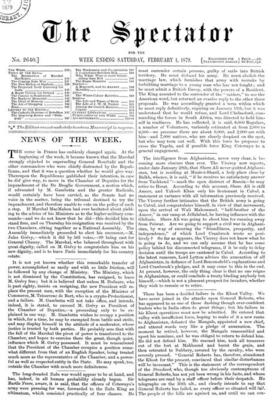The long-dreaded Zulu war would appear to be at hand,
and has, indeed, in all human probability already begun. Sir Bartle Frere, aware, it is said, that the officers of Cetewayo's army were pressing for war, forwarded to the Zulu King an ultimatum, which consisted practically of four clauses. He must surrender certain persons, guilty of raids into British territory. He must disband his army. He must abolish the marriage law, which furnishes that army with recruits by forbidding marriage to a young man who has not fought ; and he must admit a British Envoy, with the powers of a Resident. The King assented to the surrender of the "raiders," to use the American word, but returned an evasive reply to the other three proposals. He was accordingly granted a term within which he must reply definitively, expiring on January 11th, but it was understood that he would refuse, and Lord Chelmsford, com- manding the forces in South Africa, was directed to hold him- self in readiness. He has collected, it is said, 8,000 Regulars, a number of Volunteers, variously estimated at from 2,000 to 6,000—we presume there are about 6,000, and 2,000 are with him—and 7,000 natives, who are clearly despised on the spot, but who may turn out well. With this force he proposes to cross the Tugela, and if possible force King Cetewayo to a general engagement.


































